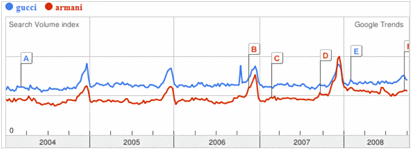We're half-way through the 'golden quarter' and all reports seem to suggest this won't be a great Christmas for the retail sector. Consumer confidence has been seriously knocked by the increasingly worrying economic uncertainties around us. Inflationary pressures, the shrinking availability of credit and fears over unemployment will all contribute to a serious deterioration in consumer demand. Footfall will only be maintained through significant sales discounts on the high street with rammed department stores merely belying the P&L reality for most involved.
It's during times like these that retailers need to take stock of their marketing activities, and look to opportunities they have not yet fully exploited. Online marketing is an area the retail industry has traditionally been slow to embrace (compared to say the travel, finance or gaming sectors) and, by extension, paid search and natural search are not nearly sufficiently exploited.
This is a serious failure given that two thirds of the UK population use the internet in some way over the Christmas period, with 14% of Christmas shoppers opting to conduct their gift buying online in 2007 (up from 7% in 2006). If that wasn't enough, a survey by Media Screen found that 90% of those online Christmas gift shoppers used search engines to find their gift of choice. That equates to an estimated £6.7 billion worth of Christmas orders in the UK coming directly from searches made using the major search engines (principally Google of course with its 85%+ market share of UK searches). This is before we consider the impact search engine visibility has on offline sales (Yahoo! has a great study that quantifies this relationship, called Research Online Buy Offline, which we recommend all online retailers take a look at). So the importance of search engine marketing during the Christmas period is obvious.
Any improvement to your search marketing in the run-up to this Christmas is of course constrained by the fact that Christmas is only a few weeks away. The good news is the trading window has been getting narrower and narrower for years - in 2007 four out of 10 consumers started their Christmas gift shopping some time in December, compared to three out of 10 in 2006. Google search volume figures have Christmas demand making initial upward movements at the beginning of October, with the last week of November accelerating very rapidly up to a peak in the first two weeks of December. Online gift buying therefore demonstrates a very similar trend to offline gift buying, albeit approximately two weeks earlier than the offline demand trend. Ultimately, it means there's still time to make some dramatic improvements to your search marketing campaigns in readiness for the serious peaks in search behaviour from the end of November onwards.
Improvements fall into four main categories, with the last one coming with a heavy caveat given the time constraints:
- Christmas search behaviour
- Paid search stock synchronisation
- The cost of counterfeit
- Search engine optimisation.
Christmas consumer search behaviour
Typically, people searching for products online are searching for products for themselves. At Christmas this changes dramatically as people are searching for products for other people. This results in a major change in consumer search behaviour in the final quarter of the year that marketers need to be attuned to in order to respond accordingly, for example:
- You need to ensure your search engine presence is increased for the product and brand searches people make during Christmas, which are often quite different to what people search for during other times of the year (more about this later);
- Your paid search creatives need to reflect the fact that you are communicating with a gift buyer - and not the final recipient of the gift;
- Price is likely to be less of a concern for buyers, but other things are likely to be more important (delivery, certainty, trust, convenience and the personal touch, such as unique gifts and personalisation).
Understanding the changes in consumer search behaviour during the Christmas period
This first point is the pivotal building block in the entire process. Not only do people search differently, the buying cycle also gets longer. So, rather than someone buying a designer handbag by searching for 'designer handbag', the search may have begun one step earlier, with a search for 'designer accessories' or 'Gucci'. It may even have begun a step earlier than that with a search for 'gifts' or 'gift ideas'.
Also remember that we have moved from being a nation of shopkeepers to being a nation of highly empowered, shrewd consumers, so Christmas search behaviour will include words like 'reviews', 'ratings', 'compare' and 'cheapest'. These terms will need to make it into your keyword targeting decisions.
Your paid search coverage will need to increase to capture this elongated buying cycle, and your paid search creatives alter to reflect the shift in audience and their intentions.
Paid search stock synchronisation
Would you waste money on a direct mail campaign promoting a product that sold out before you even printed the fliers? Of course not. But this is what thousands of retailers do with their paid search campaigns all the time. They bid against search terms for products they don't have in stock, essentially paying the search engines for clicks that will never convert into transactions because the product isn't available.
If you're bidding against hundreds of thousands of search terms for thousands of products this is actually a problem that's hard to avoid. You'd need someone checking stock levels for every product you offer every five minutes and pulling the associated ads if stock ran out, and then putting the ads back up again when you did have the product in stock again. Last Christmas we saw this reach endemic proportions in the retail sector, with one example being the Nintendo Wii. Nobody had it in stock, but everyone was pushing paid search ads into the networks. At about £1 per click this must have been very expensive for a lot of retailers.
You can avoid and protect yourself from the above scenario by applying paid search stock synchronisation technology, such as Greenlight's proprietary AdApt platform, to your campaigns. AdApt will take a feed of your inventory (not unlike the feeds you might give Kelkoo and other aggregators) and manage which ads get shown by Google and the other search engines in real time. It will also automatically update your ads with other information that may change at random intervals, for example prices in your creatives.
The technology opens up other opportunities too, such as differential pricing based on stock levels. This also works incredibly well for sectors outside retail, such as flights or hotel rooms, and does not necessarily simply mean the consumer pays more. Cheaper pricing is often valuable if you've over-stocked something.
Don't pay for clicks that will never convert when the technology exists to safeguard your search marketing investment.
The cost of counterfeit
Dealing with unsavoury characters selling counterfeit products offline is hard enough, but it's even more of a concern online. Counterfeit providers can occupy the same search engine results pages as you - and immediately communicate to the searcher that they are infinitely cheaper, as well as claim legitimacy.
At Christmas this problem becomes even more acute, given the increase in brand search queries. For example, the Google Trends graph below shows the considerable increase in the volume of searches made for two major luxury brands, Gucci and Armani.

Both these brands operate fully transactional online stores, and will lose money if the searcher visits a site selling counterfeit goods instead of their official sites. Whether this is your brand or a brand you legitimately sell, the existence of counterfeiters online directly impacts on your revenue, particularly if they are appearing alongside your own presence in Google.
Granted, quantifying this is difficult and does need to be examined on a case-by-case basis. Tiffany & Co, for example, sells exclusively from its official website, its catalogue and its physical stores. However, if you search in Google for Tiffany & Co you'll see half a dozen paid search ads offering Tiffany products. All the products on those sites are approximately 75% cheaper than the original Tiffany items, and are all 100% counterfeit.
Dealing with counterfeiters (and brand defence generally) within the search marketing medium is difficult but entirely possible. Technology exists (see SearchSentry™) to monitor who is bidding on your brand terms within the major search engines, and determine whether they are sanctioned by you or acting unlawfully. If this is happening within paid search, Google can be quickly notified and will take rapid action. They've been sued by brands like Louis Vuitton in the past and have learnt to deal swiftly with such situations.
If this is happening within the natural search listings it is somewhat harder, but there are strategies to deal with it. None can be implemented fast enough for Christmas, unfortunately.
Incidentally, there are 1,600 websites in Google's natural index that sell counterfeit Tiffany & Co products!
What about SEO?
Now the bad news. There's almost nothing you can do right now to improve your natural search listings in time for the Christmas peak, unless you can engage with someone who knows what they're doing and follow all their advice to the letter within the next few weeks. SEO typically drives three to five times more traffic than paid search, at a lower cost-per-click, so having poor visibility in natural listings is a huge weakness in your marketing. Natural search therefore needs to be top of your list from now until next Christmas. Don't leave it until next autumn to start; get your natural rankings in place as soon as possible, broad and high, reap the rewards of those all year round and sit back and watch natural search referrals effortlessly rise when Christmas demand starts its steep ascent.
Christmas check list
In summary, here are five things you should consider today:
- Synchronise your stock with your paid search campaigns
...to make sure you're not attracting wasted clicks that simply won't convert. - Broaden your paid search keyword lists
....to reflect Christmas search behaviour, increase quality click volume and tap into the long tail where you're less likely to be competing on price. - Review your ad creatives
...to reflect the needs of the Christmas audience and compel click-through beyond price incentives. - Defend your brand and products online
....by using proactive, defensive technologies (see SearchSentry™) that protect you from counterfeiters, non-compliant affiliates and websites intent on ruining your reputation. - Get moving with SEO
....to ensure you benefit next year and next Christmas from this significant channel that will work in synergy with your paid search activity - and allow you to increase your share of voice and dominate your space.
We shouldn't underestimate the British public's underlying intent to spend this Christmas, even though the economy is a concern. Christmas is arguably a vice, in the same way alcohol and cigarettes are; they make people feel better and they'll find the money to enjoy those things, even if it means using their credit cards. Yes, trade won't be as good as we'd like, but there are certainly improvements you can make to your marketing today to stack the deck in your favour and ensure you take the biggest possible slice of the 2008 Christmas cake.



